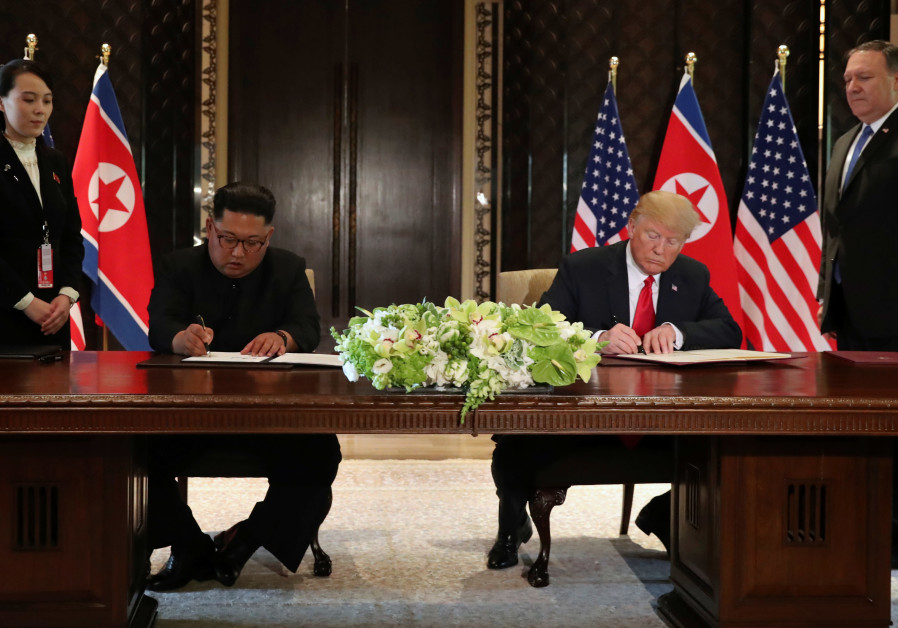Reality sets in for Trump on Iran, Korea

U.S. President Donald Trump and North Korea’s leader Kim Jong Un sign documents that acknowledge the progress of the talks and pledge to keep momentum going, after their summit at the Capella Hotel on Sentosa island in Singapore June 12, 2018.. (photo credit: JONATHAN ERNST / REUTERS)
Looking back, Wednesday may turn out to be the single most decisive day in understanding the future of the Trump administration’s policy on Iran and North Korea up to this point. And all of this in turn may have massive implications for Israeli security.
In the same 24 hours, Secretary of State Mike Pompeo permanently scrapped the “rapid” denuclearization of North Korea policy, and his Iran-policy czar Brian Hook signaled that imminent regime change in Tehran is not in the cards.
While not necessarily unexpected, these are staggering changes.
Neither Pompeo nor Hook made these crucial policy shifts explicitly.
If you look at actual wording, Pompeo said that the US was still pushing forward toward “rapid” denuclearization from North Korea. That is if you think of 2021 as rapid.
Leading into and immediately after US President Donald Trump’s summit with North Korean leader Kim Jong Un, Trump and others had alluded to a process which could start changing Pyongyang immediately.
Some spoke of getting full declarations of the North’s nuclear arsenal and of rolling back large portions of its nuclear program within 90 days.
Not only is 2021 more than two years from now, it is also after Trump’s re-election bid. That means he has given up on trying to present a deal before the next election. It also means that whatever the outcome of the November 2020 election, he or a new president will be free to ignore the 2021 deadline without any real political consequences.
Regarding Iran, Trump and Pompeo’s May speeches seemed to signal that they were going for regime change in Tehran and nothing less.
In July, within a period of a week, Trump appeared to both threaten nuking Iran into the stone age and meet to start nuclear diplomacy with no preconditions. But neither tactic got any sudden policy changes from the ayatollahs.
Further, while the Islamic Republic appears to be hurting economically – even worse than expected following the August 6 renewal of US sanctions – it also seems to be holding together politically far more than the Trump administration would like.
Enter Hook’s public announcement of a renewed attempt to get Iran back to the nuclear negotiating table, even as he acknowledged Tehran continues to give the Trump administration the cold shoulder.
There are technically still pressure campaigns against both North Korea and Iran – and the one against the Islamic Republic will intensify with another round of sanctions in November.
But you do not make a point of publicly re-offering negotiations to a regime that is ignoring you, if you expect it to disappear anytime in the near future.
What does this mean for Israel?
It means that Jerusalem will closely watch what new concessions the US may offer North Korea to keep negotiations running, or to get them kick-started with Iran.
Some concessions may not matter to Israel.
But others, such as Iran’s presence in Syria and whether Tehran gets to keep testing missiles that can reach Israel – even if it might need to make concessions on longer-range missiles at some point – could matter a lot.
Also, any concessions the US makes to North Korea could improve Iran’s hand in the nuclear standoff.
In short, the quick-fix phase of either North Korea or Iran is over – and the long slog, where the devil is in the details, has begun.
Join Jerusalem Post Premium Plus now for just $5 and upgrade your experience with an ads-free website and exclusive content. Click here>>






Comments are closed.